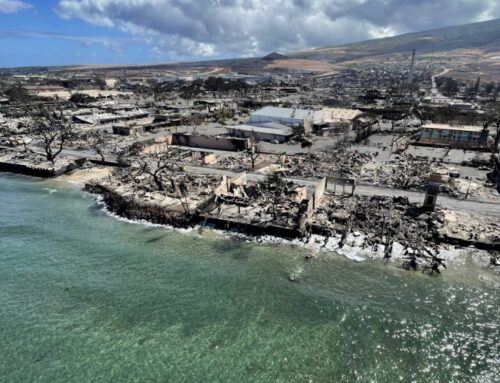There is an eerie quietness that is still felt after the recent fire disasters that decimated Lahaina, impacted Upcountry Maui. and caused evacuations in Kihei. These moments of calm are due in part to lack of visitors, but also our own processing of the events. Returning to business as usual, even if your HOA was not directly affected, can be difficult. An important element of what happens after a disaster, beyond volunteering and reconstruction, is addressing mental health. Associations can play a key role in their community’s wellbeing.
Communication Is Key
Touch base with owners. Following any kind of emergency event, communicating with homeowners is by far the most important and often overlooked step that the community association can take. It may be an emotional and overwhelming time for any resident, especially if there is property damage. Some may just want to be listened to for a few moments, others may have questions on repairs. On Maui, damage also comes in the form of lost tourism revenue. Keep an open line of communication with your owners so they are aware what steps are being taken by your association and what they will need to be responsible for in the aftermath.
Get professional advice. The board’s first challenge may be to understand whether to look to the communities Declarations and Bylaws or to the State and Local laws to determine who is responsible for what. Rules and laws change periodically, so HOAs are wise to seek legal advice if there is a serious issue involving injury or property damage. We recommend communicating regularly with members of your licensed local community staff and your insurance providers to ensure that you are doing all of the right things to ensure your communities return to harmony.
Emphasize kindness and understanding. In addition to responsibilities to their community, an HOA may be assisting employees and their families affected by a disaster, taking in guests or residents that lost their lodging or homes, or dealing with their own post-event trauma. Acknowledge these difficult times by suggesting we take a breath and interact with an extra measure of kindness and patience. Practice active listening, parroting back your understanding of what a neighbor communicated. Having empathy strengthens community bonds and helps people feel connected and understood.
Community Wellness
Gathering for food and fellowship may be helpful after a traumatic event. Health experts recommend acknowledging the disaster or problem that caused the trauma, but to not make that the focus. Organizers can steer conversations toward positive future plans or events. The group may also benefit from a collaborative volunteer activity, like filling food or supply boxes for disaster relief.
For a potluck, suggest a rainbow of foods, and assign each building or subgroup of owners a different color. Ask them to be creative with fruits, vegetables and lean proteins (the earthy colored base below the rainbow. Not only will this make a beautiful shared table, but a healthy menu is also better for wellness and recovery. Also, consider limiting or eliminating alcohol from the menu for the same reason.
Exercise is proven to be one of the best ways to relieve stress and ease trauma. Activities that involve stretching relieves tensions, and are usually within the abilities of most people. Consider organizing a yoga or tai chi session or water aerobics. It may just become a regular group activity!
Helping someone in distress
If you notice someone in great distress, or they disclose to you their distress, here are a few tips from health experts:
• Acknowledge their distress, and recognize the courage it took for them to share their concerns with you.
• Give the person space to speak about the elements they feel comfortable with, don’t try to fill the silence and don’t try to press them to divulge details or relive the experience. You can, however, check in by asking them how it feels to have shared their story, and acknowledge how difficult this moment must be. It is important for you to breathe through this, it can be very difficult to hear their story and their pain.
• Focus on non-judgmental, compassionate responses which help reduce shame. You might say “I’m so sorry you had to experience that,” or “you didn’t deserve that, and you deserve support now,” or “I want you to know you’re not alone,” or “you did what you have to do to survive.”
• You should not try to hide genuine emotion, but do try to respond in a calm and even way without becoming outraged on their behalf – this is about giving them space and holding their pain, not making yourself the central character or immediately charting a plan of action.
Please avoid phrases like “you’ll get over it”, “it wasn’t that bad” or “what’s wrong with you?” These can compound their shame and self-doubt, and make matters much worse.
Finally, time is a great healer of all things. Buildings can be reconstructed, but humans recovering from a traumatic event like a natural disaster takes time, care and understanding. After all, it is people that are the lifeblood of your community.






